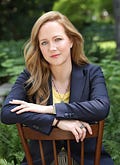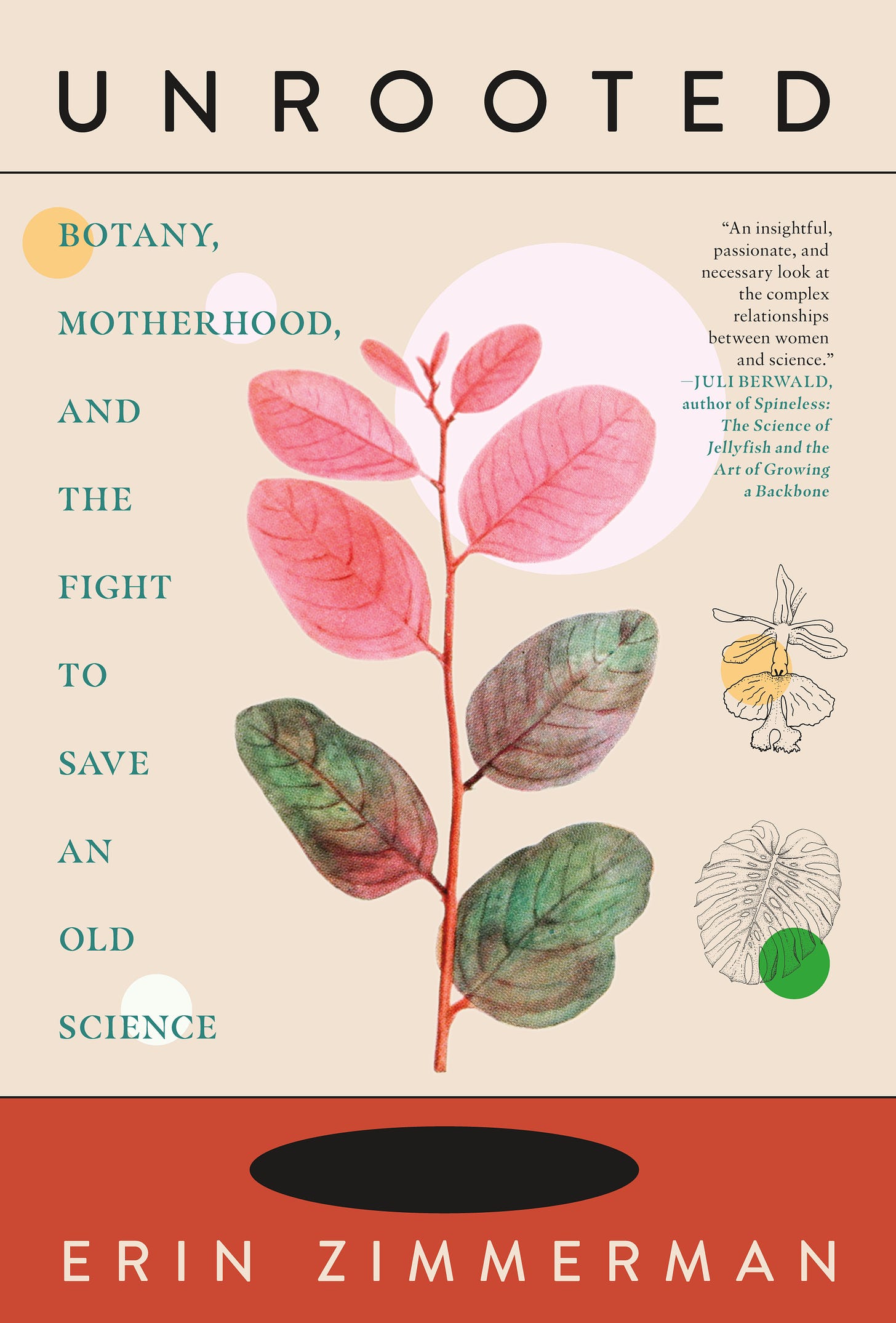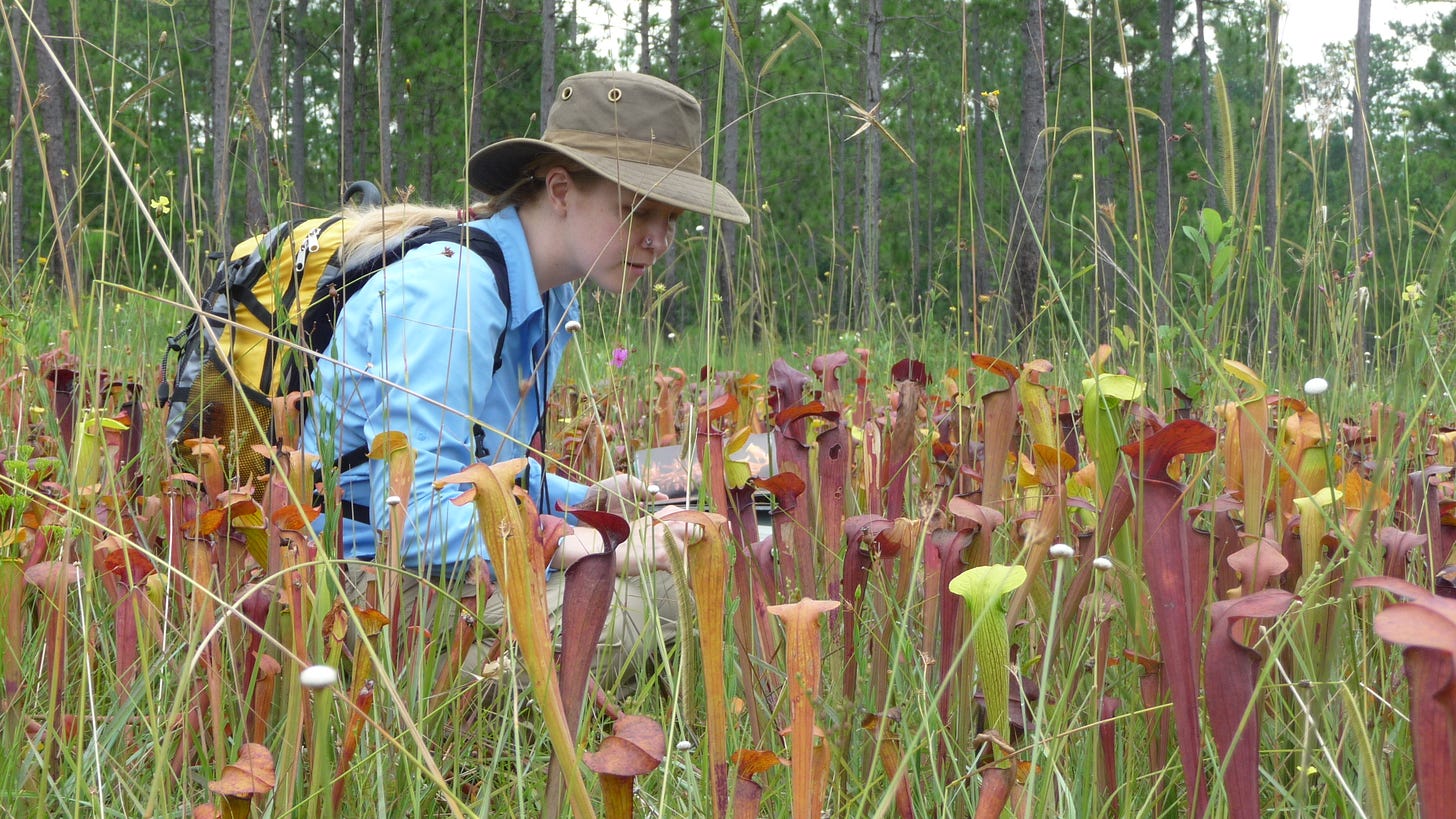"I got used to letting myself make very small bits of mediocre progress just to keep the project moving forward"
Erin Zimmerman on writing her book while caring for baby twins and how parenting has put work success and failure in perspective
Hello there! This is a good creatures interview, a series that explores the intersection of caregiving and creative practice. I’m so excited to showcase people doing lots of kinds of caregiving—people caring for kids or pets or other family members and/or caring for space through gardening or community work or activism—and lots of kinds of creative work.
If you know (or are!) a good creature whose work we should feature, send me an email—you can just reply to this newsletter.
Today’s interview is with Erin Zimmerman, who I tracked down basically the minute I saw the pub day announcement for her new book Unrooted: Botany, Motherhood, and the Fight to Save an Old Science. The jacket copy describes it like this:
a memoir about plants, about looking at the world with wonder, and about what it means to be a woman in academia--an environment that pushes out mothers and those with any outside responsibilities.
Her work speaks directly to the ongoing questions of this series, and the book provides a really compelling look at what it’s like to be a young woman pursuing a career in the natural sciences. Academia is kind of famously unfriendly to mothers, but it’s long been my sense that the sciences, with the expectation that grad students and junior faculty be visible for grueling long hours in the lab, is especially challenging. Zimmerman’s book lays out those challenges, but it also pays tribute to the history and present-day significance of her field, as well as the real wonder of looking closely. I’ve tabbed far too many sections to share here, but I really love this moment, from early on in the book, where Zimmerman is thinking about the idea that “atttention is the most basic expression of love.” She wonders
Does it also work the other way around? Do we sometimes develop a deep affection for someone or something because we take the time to look, and those details start to feel comforting and familiar? A seemingly nondescript plant, given the attention to learn its unique characteristics, becomes a friend we’d recognize anywhere. Once you take the time to learn the trees and their names, a walk in the woods is never lonely or alien again. The dark forest of childhood fairy tales becomes a familiar collection of maples, oaks, and beech trees, each with their own leaf shapes and bark patterns.
Below, we talk about having more ideas than time to write, writing a book while parenting twin babies, and struggling to balance caregiving, creative work, and rest and self-care.
Who do you care for?
I care for my four children, ages nine, six, and a set of two-year-old twins. My husband is an equal partner in all this, but has an irregular and demanding work schedule, so I’m often the person coordinating childcare, transportation, and logistics among the six of us. On a good day, I care for myself, though this tends to come in stolen moments at the edges, as it does for many of us.
What kind of creative work do you do?
I’m a science writer and botanical illustrator. I’ve just published my first book, Unrooted: Botany, Motherhood, and the Fight to Save an Old Science, which I also illustrated. Amidst the book work, I do freelance science writing and am the managing editor for a scientific society publication. I also produce a monthly newsletter for people interested in botany and natural history called A Feast for the Curious.
What’s changed in your creative life since becoming a caregiver?
My creative work (as a career at any rate) and my caregiving have always co-existed. When my first child was born, I was a research scientist. For reasons I write about in my book related to how academia and science treat mothers, I resigned about a year and a half after her birth and began writing full-time. So I wouldn’t say I’ve fully experienced the contrast between creative work as a parent versus as a non-parent. What’s changed, however, is how I do my work as my family has grown.
I signed my book deal the same month I gave birth to my twins, and wrote the manuscript throughout their infancy and early toddlerhood. I had to learn to work in very short stints, leave notes to allow myself to start quickly next time even when tired, and to let myself write poorly when I was exhausted so that I could edit it into something better later. Basically, I got used to letting myself make very small bits of mediocre progress just to keep the project moving forward. It didn’t feel great at the time, and there were many days when I definitely didn’t feel I was writing anything worthy of being published. But it got done in the end, and by the time the manuscript was in edits, I was emerging from the babyhood fog and could look at it with fresh eyes to make improvements.
So I guess overall, I’ve learned to be patient with myself and understand that my creative work and my caregiving work will affect and inform each other in different ways at different times.
What is difficult about being creative and a caregiver?
I’ve been lucky in that I rarely struggle to find ideas of what to write about, and in fact, I’ve always found that particularly in the months after each of my children were born, I was almost overflowing with ideas I wanted to pursue. What’s been difficult is the mismatch that’s created between how much I want to be doing and how much I’m realistically able to take on. I find myself scrawling story and essay ideas left and right, but I’m too tired and my workdays are too short to make use of the majority of them. I’ve had to just accept that there are ideas that will wait a long time, or even age out of being relevant in a journalistic sense. It’s also very difficult to balance the triangle of parenting, creative work, and the self-care/rest you need to maintain that creative work. I’m constantly struggling with whether I’m allotting my time properly.
What has caregiving given you / taken away from you?
There’s an opportunity cost to everything we choose to do in life, so of course caregiving has cost me creative projects that I’d otherwise have had the time and energy for. But more importantly, I think what it’s given me, as it relates to my work, is perspective. Before having children, my self-worth very much rose and fell with how well my work was going and how much success or failure I was having there. With scientific research, that’s a tough one, because frequent failure is inherent to the process. It’s cliché to say that having children gives one’s life meaning, but personally I’ve found that it does put both work successes and failures in perspective as just one part of a richer, more three-dimensional life in which a professional failure doesn’t mean that everything’s going poorly and I’m not contributing anything worthwhile. I get to draw meaning from more than one major source now.
a question for you
I love the way Erin describes the process of writing her book while caring for her newborn, then toddler twins. She says
I had to learn to work in very short stints, leave notes to allow myself to start quickly next time even when tired, and to let myself write poorly when I was exhausted so that I could edit it into something better later.
(Honestly, I think that’s a process we could all learn from, regardless of the shape of our lives or our current writing project!)
And I’d love to know: can you relate to what Erin says about working in short increments and allowing herself to write badly? how has your caregiving impacted your writing process?
Erin Zimmerman is an evolutionary biologist turned science writer and essayist. She has a bachelor’s degree in plant biology and physics from the University of Guelph and postgraduate studies in fungal genetics and molecular systematics from the Université de Montréal’s biodiversity institute. For her doctoral research, she traveled to South America to collect plant specimens, and worked at the Royal Botanic Gardens at Kew. Zimmerman has published nine academic papers, as well as numerous essays that have appeared in publications like New York Magazine, Huffpost, Smithsonian Magazine, Los Angeles Review of Books, Undark, and Narratively.
To learn more about Erin’s new book, Unrooted: Botany, Motherhood, and the Fight to Save an Old Science, see her website or read an excerpt here. You can also subscribe to her monthly botany and natural history newsletter, A Feast for the Curious. Erin can be found on Twitter talking about all things plants and science, or on Instagram doing much the same.
Write More, Be Less Careful is a newsletter about why writing is hard & how to do it anyway. Subscribe to get more encouragement, inspiration, and practical advice sent right to your inbox.
If Write More has helped you in your creative life, I’d love it if you would share it with a friend or click the red heart at the top or bottom of this post so other folks can find us!








Since having 3 kids (4.5, 3, 1.5), I have built such a better writing habit where I make serious progress in the limited time I am alotted. Sometimes I know it might be my only chance all week, and this doesn't stress me out of writing. I used to let all kinds of things stop me from writing.
Like Zimmerman, I am also able to write in stints when I can snatch them and not just because somw random thing inspired me.
I loved this piece + advice: is Erin on Substack? :)